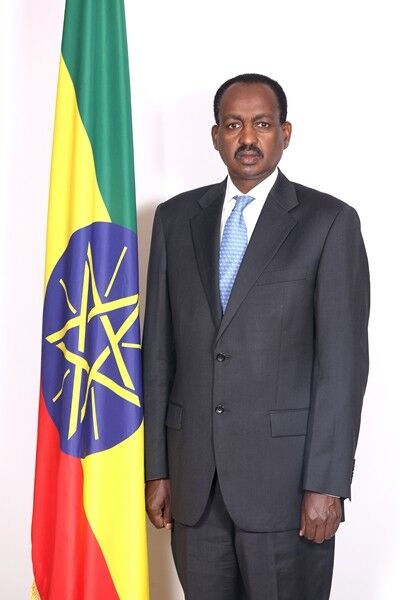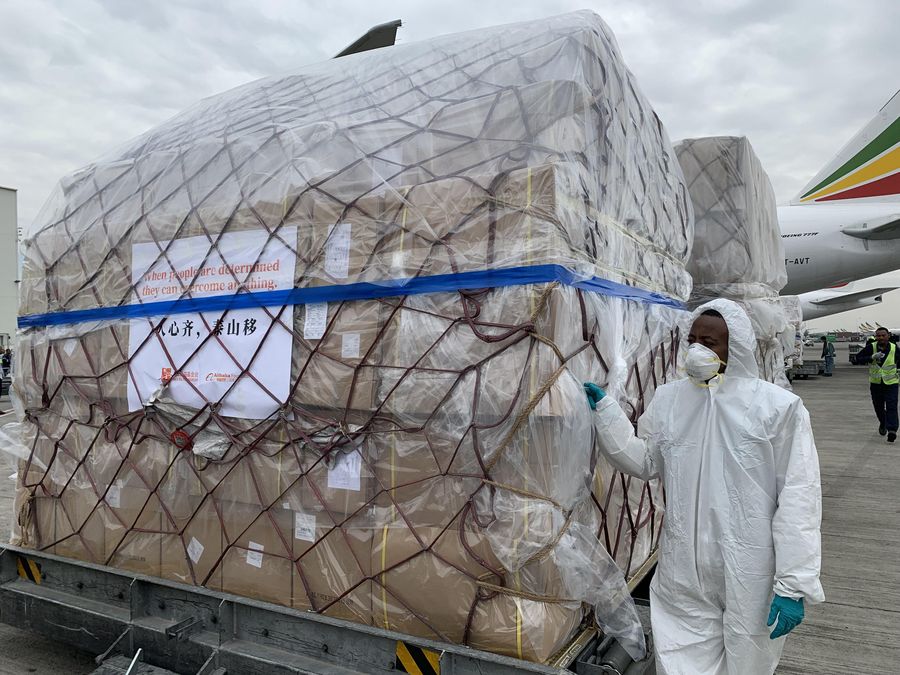Ethiopian Ambassador to China: No country can defeat COVID-19 alone
- By Zhang Junmian
 0 Comment(s)
0 Comment(s) Print
Print E-mail China.org.cn, March 31, 2020
E-mail China.org.cn, March 31, 2020
Ethiopian Ambassador to China Teshome Toga Chanaka called for international solidarity and cooperation in fighting the COVID-19 pandemic during a recent e-mail interview with China.org.cn.

"No single country, big or small, rich or poor, south or north, can win this battle on its own because the spread of the virus as we can see is borderless," the ambassador said.
Toga explained, "This is a global challenge. It is not confined to any given territory. That is why global cooperation and global strategy are absolutely necessary."
Talking about the importance of international coordination at a time when data from the WHO shows the virus has infected 697,244 people and claimed 33,257 lives across the world as of 6:00 p.m. CET, March 30, Toga emphasized, "There is a global institution, the WHO, to coordinate and work with."
The ambassador said that providing necessary resources and financial support to the WHO is urgently needed, as the organization has enormous experience, six regional offices and 149 field offices in countries, territories or areas worldwide, and is best qualified to lead the global response.
He continued, "It is time for a more concerted and coordinated global effort, not less. Isolated and national efforts alone cannot do the job well."
International cooperation on a global scale is a necessity when fighting the coronavirus pandemic, and China, as the country first exposed to the virus, can play a leading role in this action, he noted.
"The post-crisis period of recovery also needs global coordinated efforts," added the ambassador. "In order to bring our global systems back in place, the fight should be done together, and success can only be measured globally."
Bilateral support and cooperation
Ethiopia provided China with various forms of precious support when it was facing its toughest period combating the virus, fully demonstrating the two countries' comprehensive strategic cooperative partnership.
Ethiopia and China have coordinated closely since the outbreak, said Toga. "The Ethiopian government stood shoulder-to-shoulder with the government and people of China at this challenging time."
He continued, "China, after almost bringing the virus under control, in turn, is extending its solidarity to its friends like Ethiopia by sharing its experiences and also by donating medical supplies. Ethiopia is among the first three African countries to benefit from the generous support of China."
China shared its anti-virus experiences with 24 African countries, including Ethiopia, and the African Union Center for Disease Control and Prevention (Africa CDC) via a special video conference on March 18.
The ambassador said, "China understood very well the need for global solidarity, coordination and support if the positive results in the country could be sustained. Many private sectors in China including the Jack Ma Foundation, the Huajian Group and others have already delivered donations to Ethiopia. Others are in the pipeline and the task force in China is coordinating these efforts. "
Both China and Ethiopia value the significance of joint action and collective efforts, he mentioned.
Data from the Ethiopian Ministry of Health shows that as of March 30, the total number of confirmed COVID-19 cases in the country had risen to 23.
Faced by mounting challenges, Ethiopia has taken a range of measures. According to the ambassador, these include setting up a national task force; building up its diagnostic, testing and treatment capacity; enhancing public awareness; screening travellers at airports; preparing medical and isolation centers; training healthcare personnel; suspending social events; and closing its land borders.
Toga said, "As experience from China shows, the critical measure for countries like Ethiopia and many in Africa, I believe, is to focus on prevention."

Pan-African solidarity
Toga stressed that pan-African solidarity is of paramount importance as the continent sees increasing numbers of cases.
The death toll from the ongoing outbreak on the continent has reached 146, whilst confirmed cases surpassed 4,760 in 46 countries as of March 30, according to data from Africa CDC.
"It is good that Africa CDC is coordinating continental efforts and setting guidelines based on WHO general guidelines," said Toga.
According to the ambassador, Ethiopian Prime Minister Abiy Ahmed launched an initiative with China's Jack Ma Foundation and Alibaba Foundation, mobilizing the first continent wide donations for diagnostic kits and protective equipment to 54 African countries. Since March 22, Ethiopian Airlines has been forwarding the donations to all capitals across Africa. This is one good example of continental and global solidarity.
A recent press release by the African Union (AU) stated, "The relief initiative [is] part of actions towards implementation of the Africa joint continental strategy for COVID-19 led by the AU through Africa CDC."
China's contributions
Toga said that China has shown the world how to prevent and control such a national challenge with the joint efforts of government, health workers, the Chinese people, the media and all other sectors of society.
"Now China, with its own fight still at hand, decided to extend its support globally by sending health professionals to share their experiences, donating medical supplies and also contributing to the global system by donating to WHO."
China is taking the global fight seriously and understands very well that victory can only be claimed when COVID-19 is defeated globally, the ambassador highlighted.
"China has done its part in an unprecedented way," he commented.
Since the coronavirus outbreak, many countries, including member states of the AU, have lent great support and invaluable help to the Chinese government and people. Now that the country has largely brought the virus under control, it is offering emergency assistance within its capabilities to many other countries, as well as international and regional organizations such as the WHO and AU.
Anti-discrimination
Toga also touched upon the xenophobia, discrimination and stigmatization shown towards Chinese and people of Asian descent in the wake of the outbreak, urging people around the world to stop discriminating in relation to the virus.
"We need to think rationally, reasonably and [consider the] evidence," the ambassador said.
Toga believes people should understand that viruses have broken out in the past and will again in the future. As they affect all of humanity, to link a virus to the citizens of the country where it breaks out is wrong and based on a misperception.
"Leaders at all levels and ordinary people should fight equally the stigma, xenophobia and discrimination wherever it occurs," he noted, adding "human beings should support, care and love each other at times of challenges and also celebrate victory together."





